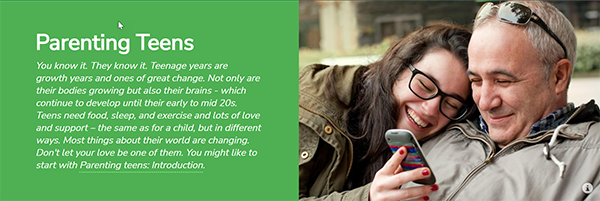Parenting Teens - Introduction
Parenting Teens - Introduction
Teenage years are growth years and ones of great change. Most things about your teenager's world are changing. Don't let your love be one of them.
Key points about parenting teens
Parenting a teenager isn't easy, but it can be a lot of fun if you follow a few basic guidelines.
- teenage years are ones of great change
- most things about their world are changing – don't let your love be one of them
- the whānau (family) is the most important building block for a healthy teen
- parenting a teenager can be a lot of fun if you follow a few basic guidelines
- teens who spend time, talk, and have a close relationship with their parents, are much less likely to drink, take drugs or have sex
What kind of changes will my teen go through?
You know it. They know it. Teenage years are growth years and ones of great change. Not only are their bodies growing but also their brains, which continue to develop until their early to mid-20s. Teens need food, sleep, exercise and lots of love and support – the same as for a child, but in different ways.
Most things about their world are changing. Don't let your love be one of them.
"I'm in a no-win situation right now. Sometimes you treat me like a child, but when I act like one, you tell me to grow up and behave like an adult. You say I’m hard to live with. Well … wear my skin for a while".
What is the most important building block for a healthy teen?
Whānau is the most important building block for a healthy teen, with a safe and secure home being the place they can learn and grow. Just like the tupuna tamariki, who believed that they would not be harmed whatever they did, today's kids now need to believe this too. They must know and trust everyone in their home.
What are some basic guidelines to help me parent my teenager?
Parenting a teenager isn't easy, but it can be a lot of fun if you follow a few basic guidelines, such as:
- keeping a close relationship
- supporting your kids as they learn from their mistakes
- serving as a good role model
Alcohol – the risks and minimising harm
Current alcohol law reform policy has highlighted an increase in parental responsibility around the supply and supervision of alcohol to young people. With new research available on the harmful effects of alcohol consumption, it is important for parents and caregivers to know about the risks, as well as ways to minimise the harm to teenagers.
By adolescence, your kids should know the facts about alcohol and your attitudes and beliefs about other drug use. Now is the time to focus on what you've already taught them and work on keeping the lines of communication open.
See the KidsHealth page on alcohol and young people for more information.
What are some tools to help me build a stronger bond with my teen?
Teens who spend time, talk, and have a close relationship with their parents, are much less likely to drink, take drugs or have sex.
The information in the KidsHealth section on parenting teens offers you some simple ways to improve your communication and build a stronger bond with your teen.
The content draws upon principles from the Tikanga Whakatipu Ririki model and from positive parenting techniques. It focuses on the topic of alcohol in particular, but you can apply the same principles to most topics challenging young people and their parents and caregivers.
Try not to be overwhelmed by all of the content.
Pick just one idea at a time – think about it and give it a try for at least a month to see what changes might happen. It's never too late to strengthen your relationship with your teen – you just have to stick with it – and find what works.
See more KidsHealth content on parenting teens
This page last reviewed 12 March 2024.
Do you have any feedback for KidsHealth?
If you have any feedback about the KidsHealth website, or have a suggestion for new content, please get in touch with us.
Email us now

